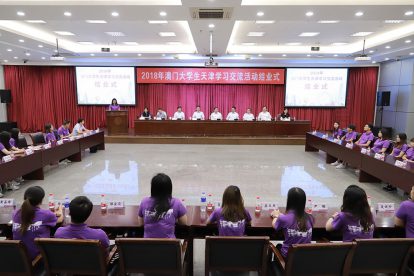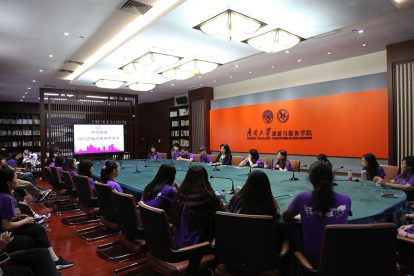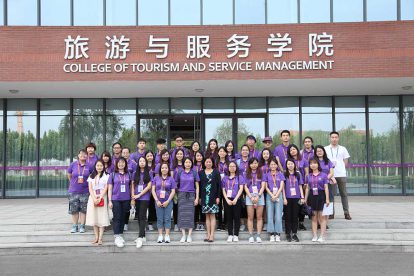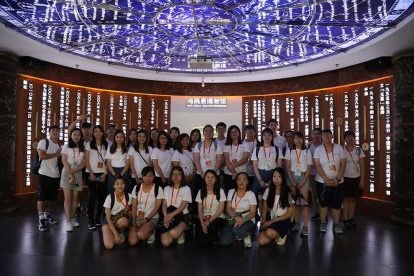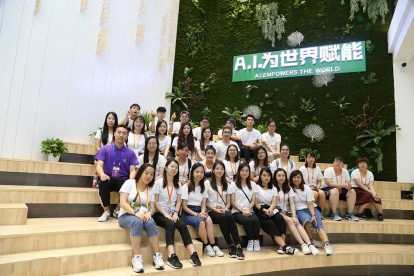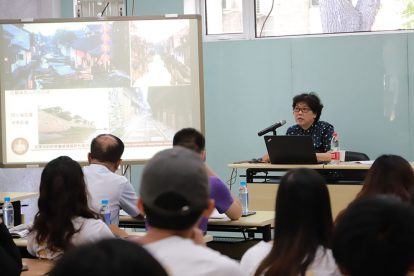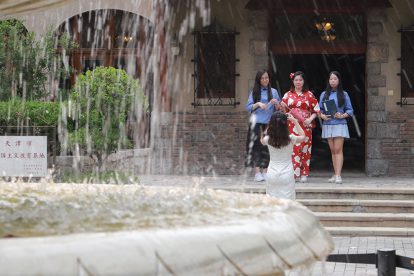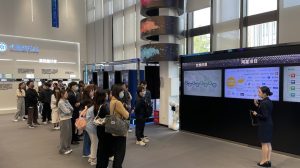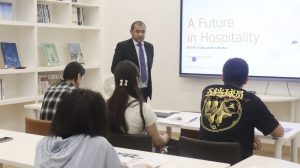A group of 30 higher education students from Macao, including a 9-strong delegation from IFT, joined in June the 2018 edition of the “Tianjin Exchange Programme for Macao Undergraduate Students”.
The 15-day scheme aimed to help Macao students learn more – at first-hand – about Mainland China’s cultural heritage, particularly that of Tianjin Municipality, as well as about the latter city’s latest economic and social developments.
The scheme was supported by Mr. Edmund Ho Hau Wah, Vice Chairman of the National Committee of the Chinese People’s Political Consultative Conference (CPPCC). Organisers of the programme included: the Committee for Liaison with Hong Kong, Macao, Taiwan and Overseas Chinese of the CPPCC National Committee; the Liaison Office of the Central People’s Government in the Macao SAR; the CPPCC Tianjin Municipal Committee; and Macao Foundation. The programme was co-organised by IFT and the College of Tourism and Service Management at Nankai University in Tianjin.
Participants in the 2018 programme came from a total of 5 higher education institutions in Macao: the University of Macau, Macao Polytechnic Institute, IFT, Macau University of Science and Technology, and City University of Macau. Students were accompanied by IFT Assistant Professor Dr. Yan Io and IFT Lecturer Dr. Gong Jian.
Timmy Wong, a recent graduate from the IFT programme leading to a Bachelor of Science in Tourism Event Management, was one of the participants. He says it was a great opportunity not only to travel, but also to have hands-on experience regarding heritage conservation at cultural sites.
The northern coastal city of Tianjin is “a part of the country to which I’ve not travelled much,” he says. “This city has a culture very different from Hong Kong and Macao, which I’m very much interested in,” Timmy adds.
“I gained a deeper knowledge about Chinese culture and history during the programme,” says another participant. “In addition, our group members became like a family. We will continue to keep in touch.”
The programme began with a ceremony at IFT on 4 June. The students set off for Nankai University on 7 June. To help participants quickly adapt to their new surroundings, Nankai University recruited a total of 5 peer mentors, each in charge of providing support to a group of 6 Macao students.
The exchange programme had 2 parts: the first featured site visits, lectures and movie screenings; the second stage included short-term internship activities for participants to apply what they had learned regarding cultural heritage promotion.
The first stage lasted for about a week, with students touring a number of famous landmarks in Tianjin. These included many historic sites, such as the Mansion of Prince Qing (a place also known as Qingwangfu) and the Garden of Serenity. The latter is a former residence of China’s last emperor Puyi, and is also known as Jingyuan Garden. The group also visited several museums, including the Tianjin Museum and a museum dedicated to the Tiajin-based Sea-Gull Watch Co. The visitors attended cultural and creative product exhibitions, and toured the Port of Tianjin and the local facilities of artificial intelligence technology company iFlyTek Co Ltd.
The programme organisers also took students to a kung fu performance and on a visit to a kung fu school. The group additionally attended a piano concert and visited the local music conservatory.
The exchange programme included 5 lectures, delivered respectively by scholars from Nankai University and the head of a company overseeing the conservation of historical sites in Tianjin. The lecture topics were: the “Belt and Road” initiative; the development of Hebei province’s Xiong’an New Area; rural tourism; tourism product development; and cultural heritage conservation.
Hands-on learning
Students enjoyed a short leisure break before the second stage of the exchange programme. During that period, they attended a performance of the famous ballet “Jingwei” and a women’s volleyball match. The activities were arranged by Nankai University.
For the second stage, Macao students were divided into 3 teams for short-term internship activities at local venues. Each group featured an aggregate of 10 people drawn from the various participating Macao higher education institutions. Each team was accompanied by one peer mentor from Nankai University.
One team performed its practicum in the Mansion of Prince Qing, an historic building dating from 1922. It is considered one of the most iconic pieces of architecture within the grounds of the former British concession in Tianjin. Students in that group were trained to serve as guides to visitors, and also had the opportunity to discuss promotional activities for the Mansion of Prince Qing.
Members of the second team worked as interns at the Jingyuan Garden, built in 1921. The historic site – officially protected by the Municipality – is where the last emperor of the Qing Dynasty, Puyi, lived between 1929 and 1931. The students were briefed about the garden’s history and learned how to promote the conservation of an historic building through site inspections. In addition, they volunteered to introduce the history of Jingyuan Garden to visitors.
The third team performed its practicum at Tianjin’s Xiannong Courtyard, a complex of buildings completed in 1925. The area was renovated in 2006, under the concepts “protection first, rational utilisation, restoration to original appearance, safety and applicability”. The compound now showcases a mix of historical and contemporary architecture, offering food and drink outlets, public amusements, shops, and exhibition areas. The students conducted surveys on the cultural heritage experiences available at the site, its marketing strategy, and the operational model of Xiannong Courtyard. They also produced short videos to promote Xiannong Courtyard.
The programme’s closing ceremony was held at Nankai University on 20 June. It was attended by representatives from the organising bodies. During the event, student representatives reported the results from their attendance of the cultural exchange programme. The Secretary of the Communist Party of China at Nankai University congratulated the Macao students for their fruitful journey in Tianjin and handed them their respective diplomas.
The group returned to Macao on 21 June.
By IFT Assistant Professor Dr. Yan Io and IFT Lecturer Dr. Gong Jian
Prof. Qiu Hanqin, Dean at the College of Tourism and Service Management at Nankai University in Tianjin Municipality, says this year’s edition offered a deeper focus on Tianjin’s cultural, economic and social features. “In the previous editions [of the exchange programme], the visits were mostly to local attractions,” she says. This time, participants also visited other types of sites, including the Port of Tianjin facility.
As in previous years, the 2018 edition of the programme included short-term internship activities for participants at prominent cultural heritage sites in Tianjin.
“Young people could share their thoughts with us and propose fresh tourism planning ideas or promotion schemes for the attractions,” says Prof. Qiu. “This is a feature that fits particularly students engaged in tourism event management studies.”
Macao Foundation President, Dr. Wu Zhiliang, says the Tianjin Exchange Programme for Macao Undergraduate Students is an important initiative to nurture the talent of young people in Macao. Participants can gain new insight into heritage protection and rejuvenation, and later apply that knowledge in Macao, he says. Macao Foundation is one of the entities supporting the scheme.
IFT President Dr. Fanny Vong says the exchange programme participants additionally play while in Tianjin the role of ambassadors for Macao.



